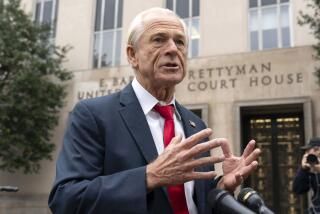Still, He Is Expected to Play Key Role in Walsh Inquiry : For McFarlane, Plea All but Ends Iran Drama
- Share via
WASHINGTON — A year after his despairing attempt to commit suicide over the Iran-Contra scandal, Robert C. McFarlane stood before a federal judge at an impeccable parade rest Friday and agreed to settle his account.
Grayer and grimmer than he was when he was President Reagan’s much-admired national security adviser, the 50-year-old ex-Marine softly acknowledged that he wished to plead guilty to four counts of withholding material information from the Congress.
He understood, he told U.S. District Judge Aubrey Robinson, that he could get as much as four years in prison and a fine of as much as $400,000. He understood that there had been no agreement on his sentence. He understood that his decision was final.
Answers Litany of Questions
For 15 minutes, he stood before the bench, replying to the carefully constructed litany of questions from the judge who will set the price for his role in a cover-up that shattered into a scandal now plodding to an end in the courts. “Yes, sir,” the defendant said. “Yes, sir. I do, sir.”
Then he heard his guilty plea accepted, and his freedom for now continued on his own recognizance. He would be notified, the judge said, of a date for sentencing.
For Bud McFarlane, the brief appearance in the silent courtroom all but ended the bizarre tale of the secret arms sales to the Ayatollah Ruhollah Khomeini’s Iran and the diversion of the money to insurgents in Nicaragua.
For the investigation by independent counsel Lawrence E. Walsh, now in its 15th month, the somber proceeding marked a turn toward the homestretch in which McFarlane is expected to become a significant figure, lending his assistance in the inquiry.
In the bright sunshine outside the U.S. courthouse, McFarlane was once again the unflapped, unflappable technocrat who once walked the Administration’s point on foreign policy crises.
Contrition Behind Him
His contrition was behind him. He had tried to make amends by correcting the falsehood he told House committees. He had, as the judge noted on the bench, even tried to take his own life.
When he left the courthouse, he made only a momentary effort to justify himself once again. “My actions were motivated,” he said, “by what I believed to be in the foreign policy interest of the United States.”
Then, in the grave baritone made famous in hundreds of background briefings and days of testimony before congressional investigators, he instinctively turned once again to the big picture.
“It is unfortunate that the fundamental issue here--why congressional-executive relations broke down so tragically--has not been and apparently cannot be addressed in the Congress or the courts,” he told reporters. “I believe strongly that an in-depth exploration of these larger institutional questions is essential if the United States--meaning the President and the Congress--is to shoulder its global leadership responsibilities in the years ahead. It is my earnest hope to contribute to that effort.”
At that he walked away with his attorney, declining to take questions.
Shultz Reaffirms Friendship
At the White House, where he was participating in a briefing on Panama, Secretary of State George P. Shultz told reporters: “Bud McFarlane has been a friend and colleague and I have felt and continue to feel he is a person to be held in very high esteem. And he has worked faithfully as a public servant. If he had made some mistakes . . . I don’t think I’ll comment about it further, other than to say that Bud McFarlane continues to have my strong friendship.”
Another friend, with whom McFarlane has been in close touch since the Iran-Contra affair began to leak out in November, 1986, said that McFarlane has come to terms with what happened. “He’s fine,” the friend said. “He’s still very busy. He’s still thinking deep thoughts about the Middle East and all of the problems over there.”
To his close friends, McFarlane has said little about his troubles, even when there were reports that he faced indictment for perjury.
Remained an Enigma
Even after two years in the Iran-Contra spotlight, he remained as much an enigma as ever--outwardly serene but inwardly so tormented that he attempted suicide in February, 1987; a man of seemingly inexhaustible patience, who briefly revealed cold fury before the congressional hearing into the scandal.
And, while he admitted that he had withheld information from Congress and prepared to wait for Judge Robinson to decide whether he should go to jail, he remained the razor-trimmed, spit-shined picture of confidence.
When he completed his remarks and walked away from the courthouse with his lawyer Friday afternoon, reporters were handed prepared, typewritten remarks, headed: “STATEMENT OF THE HONORABLE ROBERT C. McFARLANE.”
He had recited it word for word.
More to Read
Sign up for Essential California
The most important California stories and recommendations in your inbox every morning.
You may occasionally receive promotional content from the Los Angeles Times.













